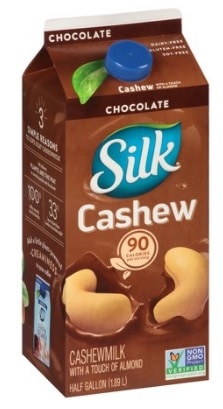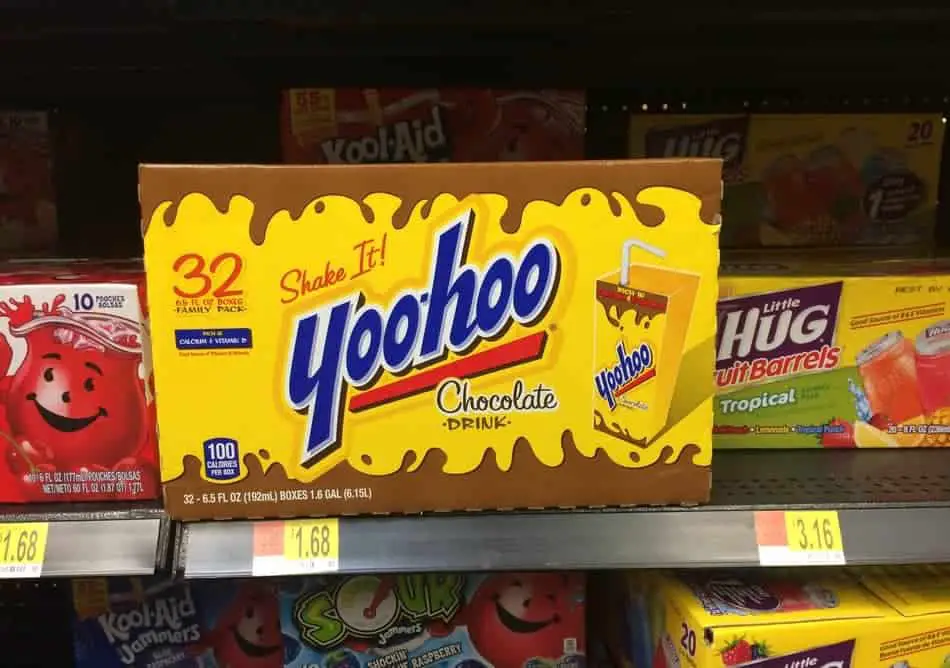Yoo-hoo isn’t exactly chocolate milk. I’ve always been told that it’s basically chocolate water, which isn’t too far from the truth. But is the beverage suitable for plant-based eaters? That’s what we’ll be discussing in this article. I don’t hear too much about the drink these days, but I do get asked from time to time if it’s suitable for vegans or vegetarians.
Is it vegan or vegetarian? Yoo-hoo is non-vegan, but it is suitable for lacto (or lacto-ovo) vegetarians. While it’s not really chocolate milk per se, it does contain milk ingredients—namely, whey protein which renders the drink unsuitable for 100% plant-based eaters.
What we’ll do here is look at why Yoo-hoo is off-limits for vegans and then discuss a suitable alternative for vegans who need to get their Yoo-hoo fix.
Why Yoo-Hoo Is Non-Vegan
Yoo-Hoo Contains Milk Proteins
The basic hierarchy of milky chocolate drinks goes something like:
- Full-fat vitamin D chocolate milk. This stuff is rich. It was always my favorite before adopting a vegan diet, and they’ve yet to come up with a suitable vegan replacement. There’s really nothing like it—it’s almost like a milkshake.
- 2% chocolate milk. It’s no full-fat chocolate milk, but it is relatively rich and creamy—usually with the help of vegetable gums, etc.
- 1% chocolate milk. A bit less creamy, but still tasty.
- Fat-free chocolate milk. This stuff is mostly water. With the help of modern food-processing technology, it’s much more creamy than it was in the past.
Anyway, somewhere between fat-free chocolate milk and mixing chocolate syrup with water, you get Yoo-hoo which is made with water and dairy derivatives.
As of 2019, Yoo-hoo is primarily made from water, high fructose corn syrup (HFCS), and whey. It also contains casein (as calcium caseinate) in small amounts.1
Specifically, the ingredients include:2
- Water
- High Fructose Corn Syrup (HFCS)
- Whey (from Milk)
- Cocoa Processed with Alkali
- Non-Fat Dry Milk
- Natural and Artificial Ingredients
- Sodium Caseinate (from Milk)
- Corn Syrup Solids
- Calcium Phosphate
- Dipotassium Phosphate
- Palm Oil
- Guar Gum
- Xanthan Gum
- Mono- and Diglycerides
- Salt
- Spice
- Soy Lecithin
- Sucralose
- Vitamin Fortification
As you can see, non-fat dry milk is in the mix, which is largely milk proteins. It’s milk with the water and fat removed which leaves little else but protein and lactose.
The food industry separates out the ingredients found in milk to be used for their various properties in processed foods.3
Milk proteins are commonly added in order to improve the nutritive value of processed food products.
Casein and whey make up about 80% and 20% of the proteins in milk, respectively.4
Casein helps stabilize and emulsify ingredients, while whey protein helps with gelling.
Overall, milk is used in processed foods to add moisture, and improve protein content, mixing ability (via emulsification), texture, foaming, and flavor.5
Yoo-Hoo Contains Non-Vegan Vitamin D3
Yoo-hoo is hardly considered a staple of the human diet, so to be considered a suitable replacement for milk, in terms of nutrition, they loaded up the drink with fortified vitamins.
As for micronutrients, the ingredients panel lists:2
- Niacinamide (Vitamin B3)
- Vitamin A Palmitate
- Riboflavin (Vitamin B2)
- Cholecalciferol (Vitamin D3)
Unlike vitamin D2, which is derived from UV-exposed mushrooms, vitamin D3 is pretty much always non-vegan due to the presence of lanolin.
Lanolin, aka wool wax or wool grease, is a waxy substance secreted by the sebaceous glands of wooled animals.6
The wax is an abundant source of 7-dehydrocholesterol, which is the precursor used for producing vitamin D3 via irradiation with UV light.7
Sure enough, PETA considers it a non-vegan ingredient.8
Vitamin D3 can also be derived from lichen which is a simple plant that grows on rocks, trees, and walls.
But, this form of D3 is not yet used to fortify foods and beverages. I.e. you’ll only encounter it on specialty products like vegan dietary supplements.
What About Other Yoo-Hoo Varieties?
If you haven’t noticed, the brand has put out several variations of the original over the years. Chocolate PB, chocolate caramel, etc. There was a time when they even offered a chocolate banana flavor.
Unfortunately, none of these variants qualify as vegan.
For example, Yoo-hoo Strawberry contains:9
- Water, HFCS, and Whey
- Non-Fat Dry Milk
- Natural and Artificial Flavors
- Corn Syrup Solids
- Sodium Caseinate
- Calcium Phosphate and Dipotassium Phosphate
- Palm Oil
- Guar and Xanthan Gums
- Emulsifiers (Soy Lecithin, Mono- and Diglycerides)
- Sucralose
- Vitamin Fortification
- Artificial Colors (Red 40, Red 3, and Blue 1)
There are several other flavors, but they’re all some combination of water, HFCS, preservatives, emulsifiers, flavorings, dairy proteins, and non-fat dry milk.
Vegan Yoo-Hoo Replacements
If you’re a fan of Yoo-hoo, you’ll be glad to know that vegan chocolate milk products are an excellent replacement, as they usually taste like chocolate-flavored water.
Vegan chocolate milk is made with plant milks which are largely composed of water with small amounts of any water-soluble components that managed to leach from the plants (e.g. almonds or soybeans) into the aqueous medium.
Like with low-fat milk and Yoo-hoo, they also contain vegetable gums in order to increase the viscosity of the end product.
You’ll want to test a few products out to find the one that’s most to your liking.
I personally prefer chocolate cashew milk.

I honestly don’t think I’d be able to tell it apart from Yoo-hoo in a blind taste test.
But, that’s just me. Again, you’ll want to try out a few. There’s also almond, soy, etc.
Silk’s 90 calorie chocolate cashew milk contains:10
- Cashewmilk (Filtered Water, Cashews)
- Cane Sugar
- Cocoa (Dutch Process)
- Sea Salt
- Locust Bean Gum
- Almond Butter
- Sunflower Lecithin
- Natural Flavor
- Gellan Gum
- Ascorbic Acid
That’s it for the vegan status of Yoo-hoo. Thanks for reading.
You may also want to check out the following related articles:
References
- Yoo-hoo. https://en.wikipedia.org/wiki/Yoo-hoo
- YOO-HOO CHOCOLATE DRINK. Nutrition per 15.5 fl oz. https://www.dpsgproductfacts.com/en/product/YOO-HOO_CHOCOLATE_DRINK_CANBOTTLE_15_5
- Chandan R. Dairy-Based Ingredients. Eagen Press, 1997.
- Jay R. Hoffman & Michael J. Falvo (2004). “Protein – Which is best?”. Journal of Sports Science and Medicine (3): 118–130.
- Understanding Food: Principles and Preparation (Page 211). Amy Brown – Wadsworth Cengage Learning – 2011. ISBN-10: 0-538-73498-1
- Lanolin. https://en.wikipedia.org/wiki/Lanolin
- Holick, M. F (2007). “Vitamin D deficiency”. New England Journal of Medicine. 357 (3): 266–81. https://www.nejm.org/doi/full/10.1056/NEJMra070553
- Animal-derived Ingredients Resource: Living. https://www.peta.org/living/food/animal-ingredients-list/
- YOO-HOO.COM. YOO-HOO STRAWBERRY DRINK. Nutrition per 6.5 fl oz. https://www.dpsgproductfacts.com/en/product/YOO-HOO_STRAWBERRY_DRINK_TETRA_6_5
- Silk Cashew Chocolate Non-Dairy Cashewmilk, Half Gallon. https://www.walmart.com/ip/Silk-Cashew-Chocolate-Non-Dairy-Cashewmilk-Half-Gallon/45594086


